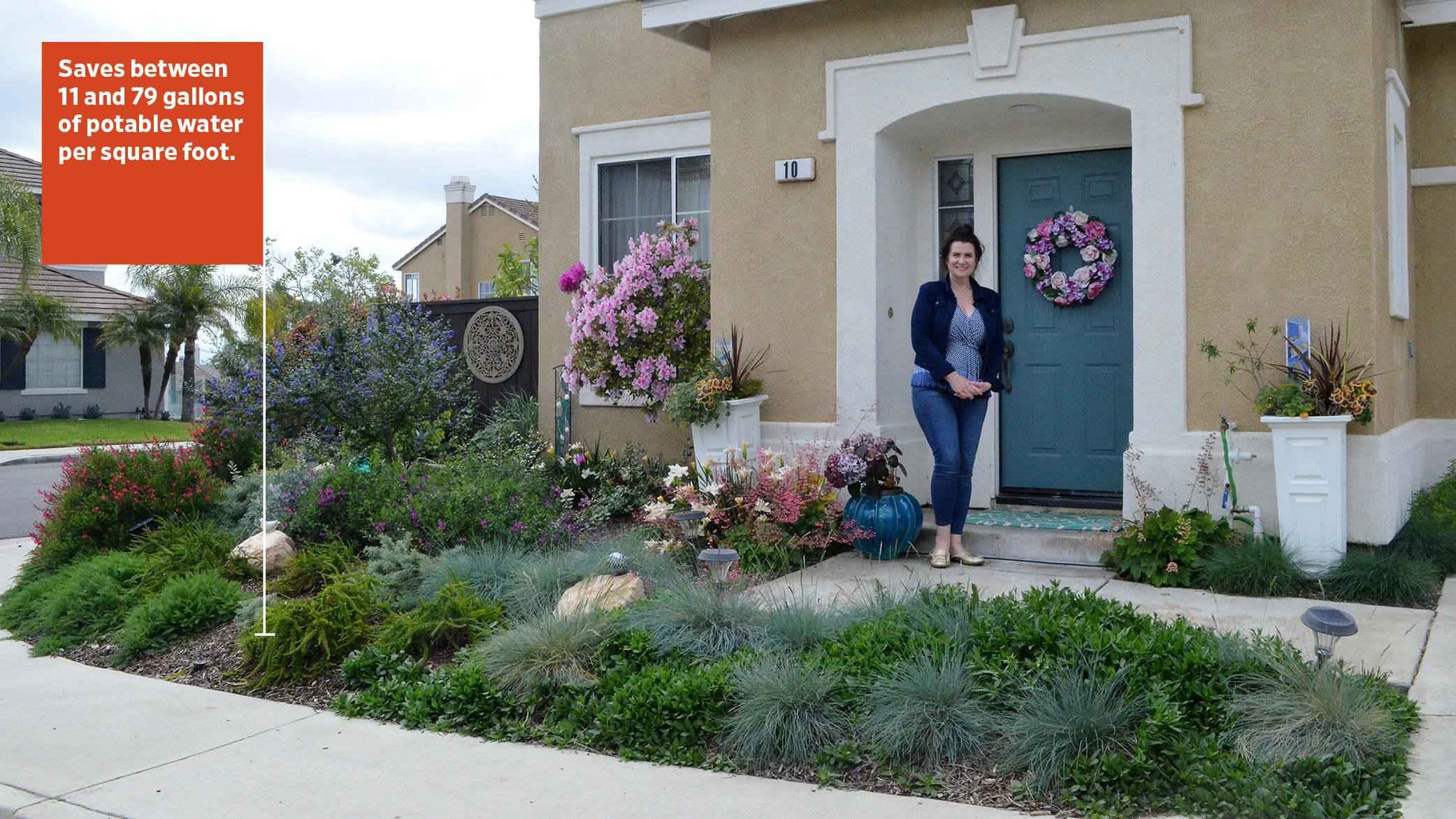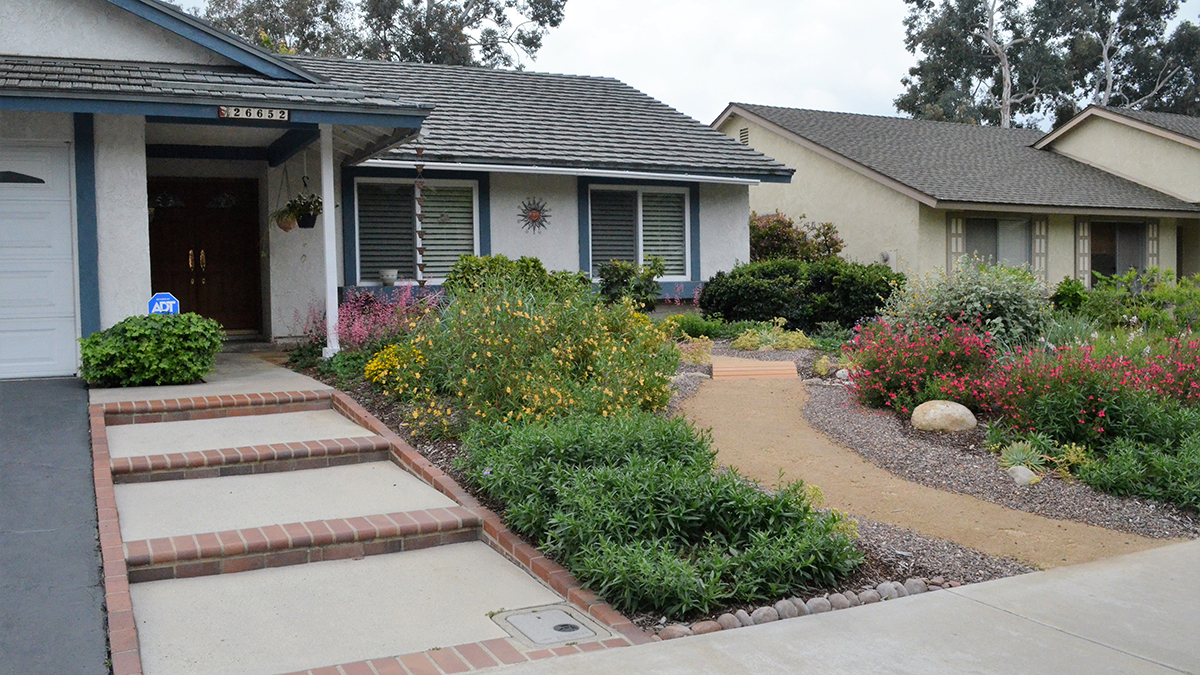
NatureScape homeowner in Orange County, California / Jodie Cook Design, Inc.
Turf lawns require vast amounts of water to maintain and also provide no habitat for native plant and animal species. Through NatureScape, an innovative program in Orange County, California, Jodie Cook, ASLA, SITES AP, helped homeowners transform their turf front yards into water-saving native plant gardens that can sustain a range of native bird, bee, and butterfly species. The program, which is available to 179,000 customers in the 37-square-mile Moulton Niguel Water District, has incorporated over 15,000 native plants and more than 120 green infrastructure elements into front yards.
Background:
Coastal Orange County, California, is one of the planet’s few biodiversity hot spots because there is an incredible richness of endemic biodiversity. Unfortunately, many endemic and native plant species in the region are threatened by development and climate change. The decline of these plant species and their replacement with exotics adversely impacts the native insect and bird populations that rely on them. Like much of California, Orange County also experiences drought and low water availability.
In 2017, Jodie Cook Design, Inc., Tree of Life Nursery, and the Moulton Niguel Water District partnered on NatureScape, an initiative that offers homeowners rebates to transform lawns into biodiverse, water-efficient gardens.
NatureScape is designed to achieve four long-term goals:
Educate: The program offers free bi-weekly, interactive homeowner workshops on biodiverse, watershed-friendly landscapes taught by a Sustainable Sites Initiative (SITES) approved professional. Most workshop participants have no prior knowledge of native plants. Attendance is mandatory for any homeowner seeking to undertake a NatureScape transformation.
Enhance Biodiversity: Through the program, water-intensive turf and shrubs with no ecological value are removed without chemicals and replaced with a diverse range of ecosystem-supporting native plants. Studies have found most turf replacement projects incorporate 6-10 different plant species, typically exotics. The smallest NatureScape garden features at least 15-20 different species, and the larger gardens substantially expand native plant diversity. Many of the plants used in the gardens are endemic, rare, and some are threatened with extinction.
Sustainably Manage Water: The Moulton Niguel Water District’s service area surrounds the Aliso Creek watershed, a persistently non-point-source-polluted stream that catches overland stormwater runoff, so eliminating front yard runoff benefits the creek. As part of NatureScape, front yards are designed as green infrastructure, with swales and rain gardens made up of native plants that capture and infiltrate runoff.
Furthermore, to reduce water waste from automated irrigation systems, homeowners in the program agree to remove them and instead hand water or install their own high-efficiency systems. Studies have shown manual watering reduces outdoor water use by 33 percent. The water district also provides advanced, weather-based irrigation controllers free of charge.
The greatest water savings from these systems occur during dry summer months when reduced water use is essential. Once established, native plant gardens need no supplemental winter irrigation in a normal rain year and only monthly winter irrigation during droughts.
Build Garden Culture: NatureScape creates a culture of sustainable gardening by providing workshops and personal homeowner garden-care coaching both before and after installation. The program has spawned a successful annual NatureScape garden tour, which saw more than 500 participants during its first year. The tours increased workshop attendance and program applications.
NatureScape has also led to a program created in partnership with the California Native Plant Society to increase the availability of native plants in retail nurseries and provide education to nursery personnel on native plant care.
According to Cook, front yards are a powerful influence on neighbor behavior. Research has found that for every visible lawn transformation using water district rebates, it is almost three times more likely that a neighbor will follow, even without district funding.
- NatureScape, Moulton Niguel Water District
- Garden Tour Shows South Orange County Homeowners How to Adopt a Native Alternative, The Orange County Register
- Evaluating Landscape Effects of Turf Replacement, California Water Blog
- Water-Smart Landscapes, Environmental Protection Agency
- CalScape Nursery Program, California Native Plant Society
- Just for the turf of it: Turf replacement as a water conservation tool, Journal of Soil and Water Conservation
- Provide dedicated funding for green stormwater infrastructure.
- Incentivize planting of locally/regionally appropriate and biodiversity-supporting vegetation.
- Assess climate change risks to biodiversity and promote greenways and biocorridors for plant and animal migration.

NatureScape in Orange County, California / Jodie Cook Design, Inc.